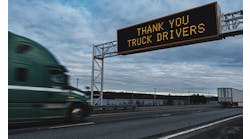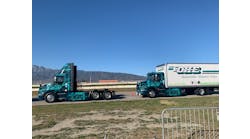Less than two months from the April 1 date when full enforcement of the electronic logging mandate begins, the devices are still causing a high level of confusion.
In January, I had the opportunity to observe ELD inspections at a weigh station on Interstate 5 with Abe Dunivin of the Oregon Department of Transportation. It allowed me to see first-hand how much trouble some truckers are having transitioning to the electronic age.
In one case, a driving team was unable to log into their device, and instead were still using paper logs. Dunivin suggested ELD problems are so serious it would be a good idea to extend the “soft enforcement” compliance date.
That idea was dismissed by Collin Mooney, executive director of the Commercial Vehicle Safety Alliance. He stated the mandate timeline was known years in advance, and the months leading to April are meant to aid the ELD transition.
Likewise, Dave Manning, chairman of American Trucking Associations, said delays penalize companies that have invested money and training time to comply. He added ELDs could lead to needed tweaks to hours-of-service rules.
These comments are accurate, but may be underestimating the current extent of ELD confusion on the nation’s highways. Dunivin called what I witnessed commonplace, and said it has made inspections more complicated in the short term.
“We have received lots of training on how devices are supposed to work, but I wonder if [the Federal Motor Carrier Safety Administration] ever realized all the differences among all the varieties,” he said.
Any truckers still avoiding ELDs in hopes there will be a change to the mandate are only hurting themselves. The main reason behind the inspection woes was not enough training and real-world experience. Opponents point out some ELD firms have experienced technical problems in the six weeks since implementation. But that is not reason enough to believe the mandate cannot work.
Some truckers also have sent me messages complaining about the growing number of waivers and exemptions, especially those granted to large fleets. ODOT’s Dunivin noted these have the possibility of creating further confusion for truckers and inspectors alike.
Most exemptions have short lifespans, and would generally be a non-issue if “full enforcement” was delayed. A delay would also provide inspectors additional options rather than having to place drivers out of service if they honestly appear to be trying to do the right thing with their ELDs.
That seems like a reasonable solution to a problem that will certainly still exist come April.





